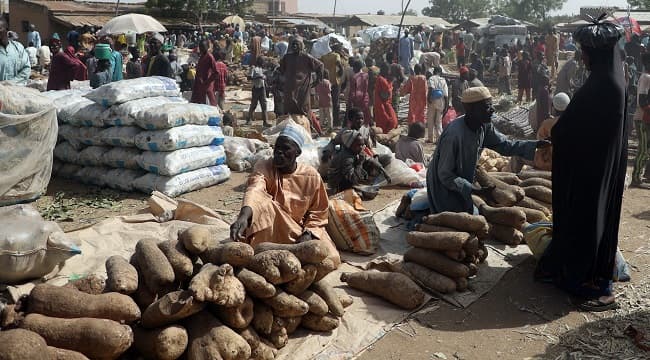
Nigeria’s inflation rate reached a new high of 34.19% in June 2024, according to the National Bureau of State Statistics (NBS).
This is a 0.24% increase over the NBS’s May 2024 inflation figure.
“The headline inflation rate in June 2024 jumped to 34.19%, up from 33.95% in May 2024. Looking at the movement, the June 2024 headline inflation rate increased by 0.24% points when compared to the May 2024 headline inflation rate,” the NBS said in its Consumer Price Index (CPI), which measures the average change over time in the prices of goods and services consumed by people for day-to-day living, released on Monday.
“On a year-on-year basis, the headline inflation rate was 11.40% higher than in June 2023, which was 22.79%.”
According to the NBS, the headline inflation rate increased year on year in June 2024 compared to the same month the previous year.
It reported that the headline inflation rate in June 2024 was 2.31%, 0.17% higher than the rate in May 2024 (2.14%).
“This suggests that the average price level will climb at a faster rate in June 2024 than it did in May 2024,” the agency stated.
As projected, food inflation increased in June 2024 compared to May 2024.
“On a month-on-month basis, the food inflation rate in June 2024 was 2.55%, representing a 0.26% increase over the rate recorded in May 2024 (2.28%),” the CPI report stated.
According to the NBS, this increase was caused by an increase in the average prices of food products such as groundnut oil, palm oil, etc. (oil & fats class), water yam, cocoyam, cassava, etc. (potatoes, yam, and other tubers class), tobacco, catfish fresh, croaker, mudfish fresh, snail, etc. (fish class).
Following the surge in the cost of key commodities, the federal government implemented a slew of measures to address the issue. It recently halted duties, levies, and taxes on imports of maize, husked brown rice, wheat, and cowpeas across the country’s land and maritime borders for 150 days.
It also approved the purchase of 2,000 tractors and 1,200 trailers, as well as the formation of a committee to assist in the development of solutions to the nation’s food crisis.
According to experts, the main obstacles influencing food production in Nigeria include instability, a lack of equipment, and other issues.